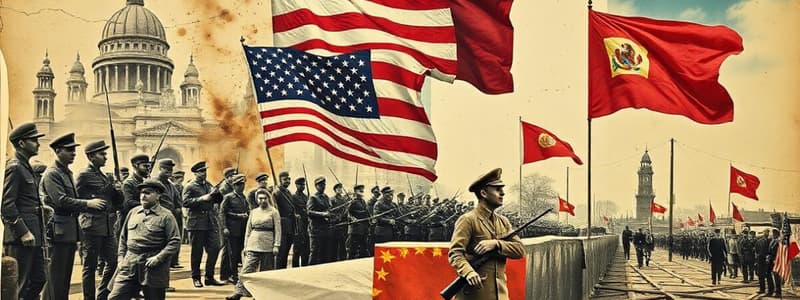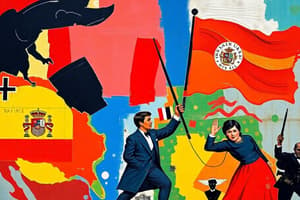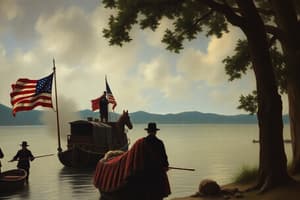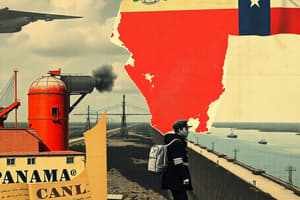Podcast
Questions and Answers
Which event is also known as 'Custer’s Last Stand'?
Which event is also known as 'Custer’s Last Stand'?
- Sand Creek Massacre
- Battle of Wounded Knee
- Dawes Severalty Act
- Battle of the Little Bighorn (correct)
The Dawes Severalty Act aimed to strengthen tribal unity by consolidating Native American lands.
The Dawes Severalty Act aimed to strengthen tribal unity by consolidating Native American lands.
False (B)
What was the primary objective of the Grandfather Clause?
What was the primary objective of the Grandfather Clause?
To disenfranchise African Americans.
The _____ was a violent labor strike at the Carnegie Steel Plant in Pennsylvania.
The _____ was a violent labor strike at the Carnegie Steel Plant in Pennsylvania.
Match the historical figures with their contributions:
Match the historical figures with their contributions:
What was one of the goals of the Populist Party?
What was one of the goals of the Populist Party?
The Battle of Wounded Knee marked the beginning of large-scale Native American resistance in the West.
The Battle of Wounded Knee marked the beginning of large-scale Native American resistance in the West.
What major event did the Pullman Strike lead to?
What major event did the Pullman Strike lead to?
Which of the following statements about Grover Cleveland is true?
Which of the following statements about Grover Cleveland is true?
The Platt Amendment allowed U.S. annexation of Cuba after the Spanish-American War.
The Platt Amendment allowed U.S. annexation of Cuba after the Spanish-American War.
What was the rallying cry associated with the explosion of the U.S. battleship in Havana Harbor?
What was the rallying cry associated with the explosion of the U.S. battleship in Havana Harbor?
The ________ was a volunteer cavalry unit led by Theodore Roosevelt during the Spanish-American War.
The ________ was a volunteer cavalry unit led by Theodore Roosevelt during the Spanish-American War.
Match the following U.S. policies or amendments with their descriptions:
Match the following U.S. policies or amendments with their descriptions:
What did the Anti-Imperialist League oppose?
What did the Anti-Imperialist League oppose?
William McKinley oversaw the expansion of the U.S. while supporting the gold standard and high tariffs.
William McKinley oversaw the expansion of the U.S. while supporting the gold standard and high tariffs.
Josiah Strong promoted U.S. expansionism based on ________ and racial superiority.
Josiah Strong promoted U.S. expansionism based on ________ and racial superiority.
Flashcards
Reservation System
Reservation System
A system implemented by the US government to force Native American tribes onto specific lands, often far away from their traditional territories. This resulted in a loss of Native sovereignty and cultural practices.
Sand Creek Massacre (1864)
Sand Creek Massacre (1864)
A violent massacre of peaceful Cheyenne and Arapaho villagers in Colorado by U.S. militia led by Colonel Chivington. More than 150 Native Americans, including women and children, were killed.
Battle of Little Bighorn (1876)
Battle of Little Bighorn (1876)
A significant victory for Native Americans, where Sioux and Cheyenne forces under Sitting Bull and Crazy Horse defeated General Custer's troops. Often referred to as "Custer’s Last Stand."
Dawes Severalty Act (1887)
Dawes Severalty Act (1887)
Signup and view all the flashcards
Battle of Wounded Knee (1890)
Battle of Wounded Knee (1890)
Signup and view all the flashcards
Populists (People's Party)
Populists (People's Party)
Signup and view all the flashcards
Homestead Strike (1892)
Homestead Strike (1892)
Signup and view all the flashcards
Grandfather Clause
Grandfather Clause
Signup and view all the flashcards
McKinley Tariff
McKinley Tariff
Signup and view all the flashcards
The Maine
The Maine
Signup and view all the flashcards
Teller Amendment
Teller Amendment
Signup and view all the flashcards
Rough Riders
Rough Riders
Signup and view all the flashcards
Anti-Imperialist League
Anti-Imperialist League
Signup and view all the flashcards
Platt Amendment
Platt Amendment
Signup and view all the flashcards
Open Door Policy
Open Door Policy
Signup and view all the flashcards
Boxer Rebellion
Boxer Rebellion
Signup and view all the flashcards
Study Notes
Chapter 27: Empire and Expansion
-
McKinley Tariff (1890): A high tariff that increased duties on imports, protecting US industries. This angered farmers.
-
Maine (1898): A US battleship that exploded in Havana harbor, leading to the Spanish-American War, known as "Remember the Maine!"
-
Teller Amendment (1898): Declared that the US would not annex Cuba.
-
Spanish-American War (1898): A conflict between the US and Spain.
-
Rough Riders: A volunteer cavalry unit led by Theodore Roosevelt in the Spanish-American War, notably involved in the charge up San Juan Hill.
-
Anti-Imperialist League: A group that opposed US annexation of the Philippines over concerns of violating democratic ideals.
-
Platt Amendment (1901): Allowed US intervention in Cuban affairs and gave the US control of Guantanamo Bay.
-
Open Door Note (1899-1900): John Hay's proposition for ensuring equal trade opportunities in China.
-
Boxer Rebellion (1900): A Chinese anti-foreign uprising suppressed by an international force, including US troops.
-
Hay-Pauncefote Treaty (1901): Granted the US the right to build and manage the Panama Canal without British interference.
-
Roosevelt Corollary (1904): Extended the Monroe Doctrine, allowing for US intervention in Latin American nations to maintain stability.
-
Gentlemen's Agreement (1907): A pact limiting Japanese immigration to the US.
-
Root-Takahira Agreement (1908): Agreed on the mutual respect of territorial holdings in the Pacific.
-
Josiah Strong: A clergyman who promoted US expansionism based on claimed religious and racial superiority.
-
Liliuokalani: Queen of Hawaii who opposed US annexation and was overthrown.
-
William Howard Taft: First civilian governor of the Philippines; implemented reforms to prepare for self-government.
-
Theodore Roosevelt: Leader of the Rough Riders and 26th US president; advocated for "Big Stick" diplomacy, conservation, and progressive reforms.
Native American History (from previous questions)
-
Reservation System: A system forcing Native American tribes onto specific areas, often far from ancestral lands, resulting in cultural and autonomy loss.
-
Sand Creek Massacre (1864): A brutal attack by US militia on a Cheyenne and Arapaho village, resulting in the deaths of over 150, mostly women and children.
-
Battle of Little Bighorn (1876): A decisive Native American victory where Sioux and Cheyenne forces defeated General Custer’s troops.
-
Dawes Severalty Act (1887): Legislation aiming to assimilate Native Americans by dividing tribal lands into individual allotments.
-
Battle of Wounded Knee (1890): A massacre of Lakota Sioux by US soldiers that marked the end of large-scale Native American resistance in the West.
Studying That Suits You
Use AI to generate personalized quizzes and flashcards to suit your learning preferences.




